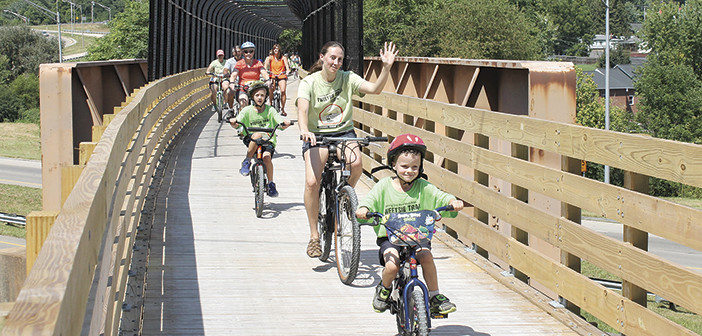By Gary Gray
More people are migrating to Washington County than any other East Tennessee county, in large part because of its outdoor recreational offerings which promote health, create small businesses and increase tax revenues through what is know as “adventure tourism.”
The term has actually been around for a while. It was defined by the Tennessee General Assembly almost six years ago in Public Chapter 383 as: “Outdoor recreational opportunities such as equine and motorized trail riding, whitewater rafting and kayaking, rappelling, road biking, rock climbing, mountain biking, hang-gliding, canoeing, paragliding, zip lining and other such activities.”
It is long past trendy; it is in full motion. Adventure tourism is leaving more money in local destinations than ever before.
“We’ve become a destination, and it’s an indicator we’re doing something right.” said Dan Reese, a Tennessee Department of Environment and Conservation Commissioner’s Council on Greenways and Trails board member. “When people are trying to put a pin on a map, they want recreation opportunities, low cost of living, affordable housing and a good school system – a prime example of why someone would want to come here. We’re looking to expand the number and types of trails across the state, and right now we’re working on connecting areas, such as Johnson City to Unicoi, and building networks of trails on blueway (navigable bodies of water).
“Having multiple venues in the area draws more tourism, but it also enhances opportunities to exercise safely. Certain areas have high rates of diabetes and heart disease, so we look at this basically as preventive health care. And the variety of offerings keeps people interested. It’s also a business model that entices public and private investment in outdoor recreation opportunities, and the impact already is evident here.”
About 1,100 people migrated to Washington County last year, topping nine nearby counties, according to the 2016 National Association of Counties American Community Survey. That’s double Sullivan County’s total and far and above Carter and Unicoi counties.
Population is a big deal because a consumer-driven economy and a declining population means fewer people have to spend more to sustain sales tax collections – the primary revenue stream for local schools and governments.
Governmental moves being made locally show support for and belief in expanding adventure tourism for economic benefit.
On Monday, Washington County Commissioners amended this year’s roughly $171,000 payment to the Washington County Economic Development Council. Commissioners agreed instead to divide that annual contribution and give the WEDC $57,000 and the newly formed Northeast Tennessee Regional Economic Partnership about $114,000.
The new group’s mission statement includes its goal of recruiting business and industry, but the three-county (Washington, Carter, Unicoi) organization also is focusing much more on outdoor offerings.
Meanwhile, Johnson City is advertising for its first-ever Outdoor Development Manager, who will work with the partnership by promoting the outdoors as a form of “economic development used to generate wealth …”
“Attracting and retaining people in our community is a function of several things: Good jobs, great schools and an outstanding quality of life to name a few,” said Johnson City Vice Mayor Jenny Brock. “The Tweetsie Trail has certainly established itself as a quality of life activity. It has shown us how a safe, beautiful trail corridor between Johnson City and Elizabethton has motivated thousands of our citizens and visitors to use each week for exercise and enjoy the health benefits it brings.
“We were also recognized with the prestigious Sustainable Transportation Award from the Tennessee Department of Transportation for establishing this beautiful transportation corridor. We now have a master trail plan to further connect and create sustainable mobile transportation corridors. Investing in a planned trail system helps make Johnson City an attractive place to live, work and play.”
There also are “motorized users,” Reese said.
“They are the ones more likely to stay at destinations longer. They might rent a houseboat on Watauga Lake. But while there, they will venture to other locations, and that’s what we’re encouraging.”




